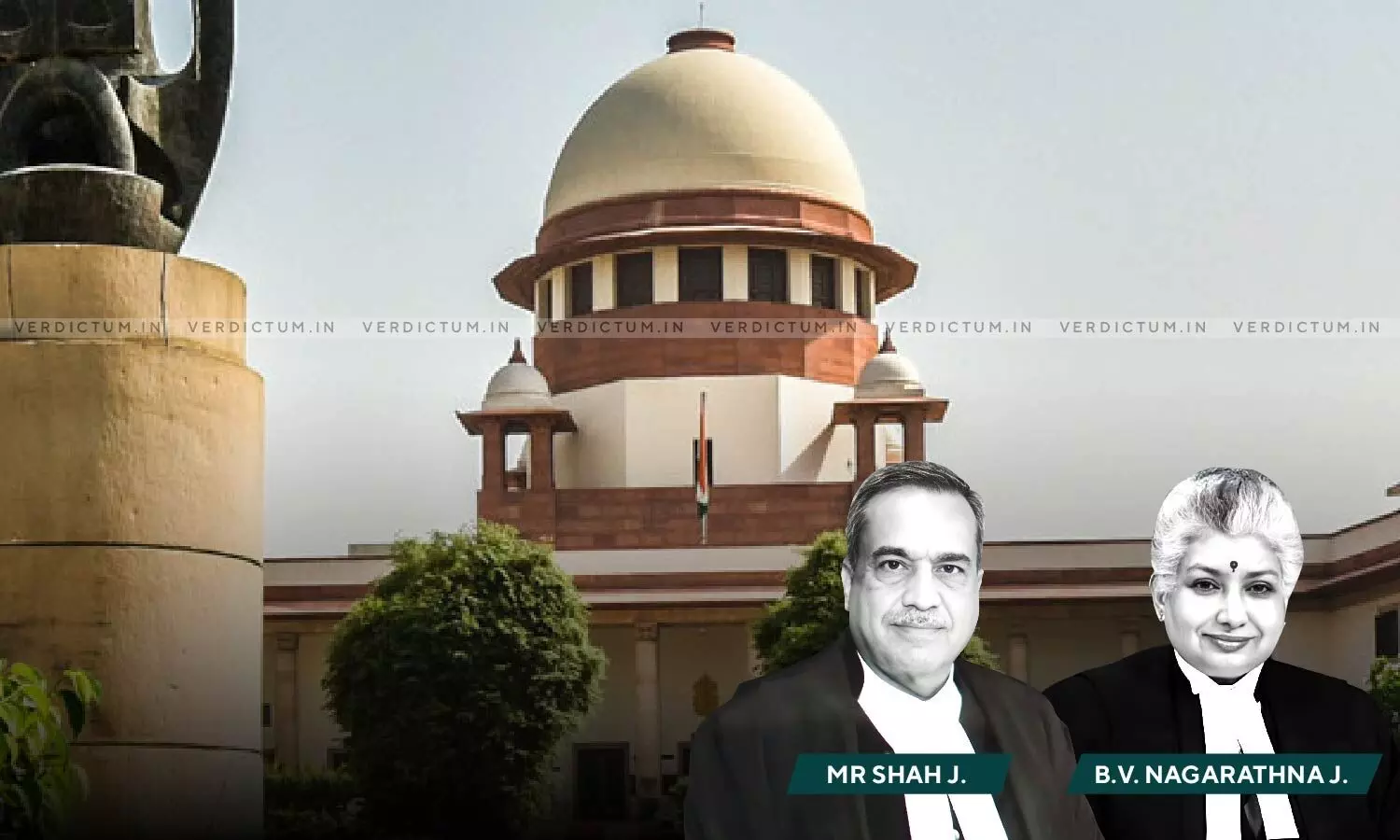
Should A Judgment Be Reviewed Because It Followed A Precedent That Was Later Overruled? - SC Delivers Split Verdict
 |
|A Supreme Court Bench of Justice MR Shah and Justice BV Nagarathna has passed a split verdict on whether a judgment should be reviewed because it followed a precedent that was later overruled.
Justice MR shah allowed the review petitions, while Justice BV Nagarathna observed that they were not maintainable and were liable to be dismissed.
Senior Advocate Sanjay Poddar appeared for the State. Senior Advocate Shyam Divan, Senior Advocate V Giri, Senior Advocate Neeraj Kumar Jain, and Senior Advocate Vivek Chib appeared for the Respondents.
In this case, the issue for consideration before the Supreme Court was whether a Judgment should be reviewed because it followed a precedent that was later overruled. The Bench was dealing with the applications preferred by the Government of NCT of Delhi and Delhi Development Authority to review and recall the orders passed in the respective Civil Appeals in dismissing/disposing of the same and to restore the same to their original files to consider the same on merits.
The applicants argued that the decision in the case of Pune Municipal Corporation vs Harakchand Misirimal Solanki, which had been relied upon while dismissing the appeals, had been overruled by a Constitution Bench of the Supreme Court in the case of Indore Development Authority v. Manohar Lal & others.
Justice MR Shah's Judgment
It was noted that the Constitution Bench of the Supreme Court not only observed that the decision rendered in Pune Municipal Corporation was overruled, but also specifically observed that all other decisions in which Pune Municipal Corporation had been followed, are also overruled.
In that context, it was said that "in view of the above specific observations made by the Constitution Bench of this Court, the objections, as above, raised on behalf of the respective respondents are to be overruled. None of the submissions/decisions relied upon on behalf of the respective respondents shall be of any assistance to the respondents, though there cannot be any dispute with respect to the proposition of law laid down in the relied upon judgments/decisions on the review jurisdiction, more particularly, in view of the observations made in para 217 in the earlier decision of this Court in the case of Indore Development Authority v. Shailendra (dead) through Lrs. (supra) and the observations made in para 365 in the subsequent decision of the Constitution Bench in the case of Indore Development Authority v. Manohar Lal (supra), reproduced hereinabove."
Further, it was also observed that "in most of the cases solely relying upon the earlier decision in the case of Pune Municipal Corporation (supra) and though the possession of the lands in question have been taken over and in many cases it might have been utilised/used by the beneficiary authorities, orders are passed declaring the deemed lapse of acquisition. The resultant effect would be to return the possession of the land/s which might have been used by the beneficiary authorities."
Resultantly, it was held that in the larger public interest, the review applications are required to be allowed and the respective appeals are required to be considered and decided afresh.
Justice BV Nagarathna's Judgment
It was observed that "Merely because that judgment is subsequently overruled by a subsequent decision of a superior Court in any other case, the same shall not be a ground for review of such judgment."
It was also observed that "if, on a question of law, a decision of a Court is reversed by a subsequent decision of a superior Court (Larger Bench in the instant case) and the same is reopened on the basis of the said subsequent decision there would be no finality of judgments of the Court even between the parties thereto. It is, hence, observed that even an erroneous judgment or order is binding on the parties thereto even if subsequently that very judgment is reversed in a subsequent decision of a superior Court. Otherwise, there would be chaos and no finality of any decision of a Court which is against public policy. Judgments rendered by a Court of competent jurisdiction as per the prevailing law are binding on the parties to the said judgment. Merely because that judgment is subsequently overruled by a subsequent decision of a superior Court in any other case, the same shall not be a ground for review of such judgment."
Subsequently, it was found that the bone of contention between the parties was with regard to the maintainability of the review petitions bearing in mind the scope and purport of Order XLVII Rule 1 CPC.
Justice Nagarathna noted that an essential principle for exercising review jurisdiction under Order XLVII Rule 1 CPC is that the review will be maintainable for “any other sufficient reason”, and that the scope of this ground was narrowed to mean a reason sufficient on grounds at least analogous to those specified in the rule.
In that context, she observed that "insofar as cases which were decided prior to the aforesaid directions issued by this Court or the High Court or cases decided even by this Court on the strength of the dictum in Pune Municipal Corporation cannot be set at naught between the parties to those cases. The judgment in Pune Municipal Corporation having been overruled, it would only lose its value as a precedent subsequent to the dictum of the Larger Bench in Indore Development Authority and therefore, cannot be cited as a precedent."
It was found that the review petitions were not maintainable and that the judgments and orders of the Apex Court ought not to be reviewed and that the review petitions were liable to be dismissed.
Cause Title: Govt. of NCT of Delhi Through the Secretary, Land and Building Department & Another v. M/s. K.L. Rathi Steels Limited and others